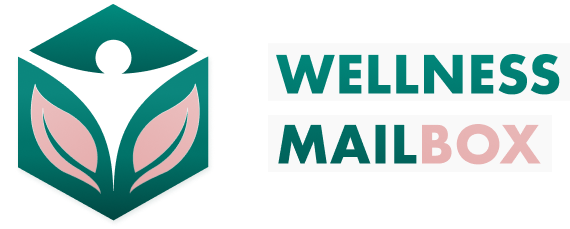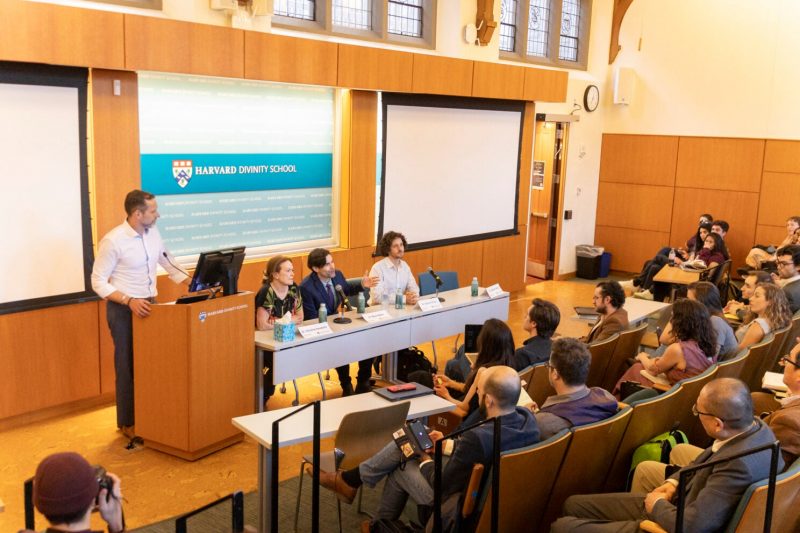Charles M. Stang (from left), Christine Hauskeller, Mason Marks, and Roman Palitsky.
Photos by Niles Singer/Harvard Staff Photographer
Health
How to untangle ethics of psychedelics for therapeutic care
Experts from law, philosophy, spiritual care discuss issues surrounding research, safer use, kicking off Divinity School initiative
There’s a telling paradox emerging in the world of treatment with psychedelics, according to Christine Hauskeller. In the past, doctors would be concerned if patients said they were hearing voices and seeing spirits. But now, it may be the doctors themselves who are responsible for those hallucinations.
“We use and induce states of what we called ‘madness’ before to cure what we’ve called ‘madness’ before and somehow create health,” said the philosopher with training in sociology and psychology at an April 16 discussion at Swartz Hall. “This is phenomenal.”
Hauskeller spoke at the first event of the Center for the Study of World Religions’ new psychedelics and ethics initiative, part of the University’s recently launched Study of Psychedelics in Society and Culture, which seeks to gather scholars and practitioners from different disciplines to discuss the tangle of issues surrounding clinical use of the drugs. In this inaugural session, speakers explored how approaches from law, philosophy, and spiritual care could help better inform ethical research and promote safer use.
Christine Hauskeller.
“[We’re seeing] an explosion of interest and enthusiasm, but perhaps too little regulation — that’s open for debate — and a fast-moving landscape,” said Charles Stang, director of the Center for the Study of World Religions.
“Psychedelic experiences don’t match to psychedelic substances, in not only that the same dose of the same substance doesn’t induce the same effects in different people, or even in the same person twice.”
Christine Hauskeller
Hauskeller said that in her view, there are two ways of approaching the study of psychedelics: by substance or experience. Studying the substance is straightforward: quantify dosages, test the chemical makeup, study the effects on different segments of the population. But studying the way patients experience the drug arguably matters more – and is a lot more complicated.
“Psychedelic experiences don’t match to psychedelic substances, in not only that the same dose of the same substance doesn’t induce the same effects in different people, or even in the same person twice,” said Hauskeller.
Bioethics provides a model for studying ethical questions around research on use. The pillars include promoting the good of society, avoiding harm to patients, and ensuring informed consent, along with fair access and distribution, she said.
These goals should be kept in mind as the medicalization of psychedelics increases, mass production looms, and financial incentives compete with ethical obligations. Hauskeller cited an example: how to keep treatment financially accessible. One session with psilocybin hallucinogenic mushrooms may cost $2,000, even though “these mushrooms grow basically everywhere.”
Mason Marks, a visiting professor at Harvard Law School from Florida State University College of Law, teaches a course on psychedelic law. He noted many parts of the legal landscape of using the drugs are largely “uncharted territory,” and informed consent is one area that needs improvement.
Mason Marks.
By analyzing publicly available informed consent documents, he found that many psychedelic clinical trials overlooked or underemphasized what he and his colleagues believe are essential elements of informed consent to psychedelic medicine.
“We believe that people should fully understand what they’re getting themselves into.”
Mason Marks
“We believe that people should fully understand what they’re getting themselves into,” said Marks, who is also the senior fellow and project lead of the Project on Psychedelics Law and Regulation at the Petrie-Flom Center for Health Law Policy, Biotechnology, and Bioethics.
In many ways, informed consent on psychedelics can follow best practices of other treatments. But psychedelic therapies also present problems that are unique: Adverse effects are often unknown. The prevalence and intensity of certain risks — prolonged side effects, permanent changes to perception, personality changes, altered metaphysical beliefs — require further research, he said.
Practitioners should be transparent about the risks and potential experiences associated with these treatments, with the goal of limiting patient exploitation or abuse, Marks said.
Roman Palitsky.
“In psychedelics, we often talk about these mystical-type experiences as a transformational, transient experience that impart some deep sense of knowledge and having made contact with something real.”
Roman Palitsky
Roman Palitsky, an assistant professor and the director of Research Projects in Spiritual Health at Emory University, took a different approach to the ethics of psychedelic treatment. He suggested that using a SERT-based framework — spiritual, existential, religious, theological — would include the kinds of experiences that tend to arise from these treatments.
“In psychedelics, we often talk about these mystical-type experiences as a transformational, transient experience that impart some deep sense of knowledge and having made contact with something real,” Palitsky said. A SERT framework could include considering the religious or existential beliefs that patients have and how those beliefs overlap with their mental health concerns.
Palitsky mentioned that there are care providers already trained in integrated care: chaplains. They can add a lot to the conversations around incorporating SERT training into psychedelic care, which has a lot of potential to benefit the patient in enormous ways.
“As a colleague of mine once said, we’re not adding religion here,” he said. “We’re just not taking it out.”





